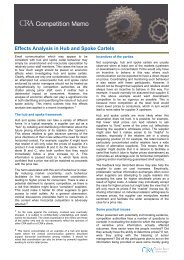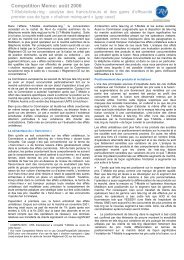CUSTOMER AGREED REMUNERATION - CRA International
CUSTOMER AGREED REMUNERATION - CRA International
CUSTOMER AGREED REMUNERATION - CRA International
Create successful ePaper yourself
Turn your PDF publications into a flip-book with our unique Google optimized e-Paper software.
REPORT BY <strong>CRA</strong> INTERNATIONAL<br />
2.3.1<br />
2.4<br />
Among non-purchasers, 37% agree that CAR would increase the likelihood that they<br />
would use an adviser. In practice, however, these individuals would only learn about CAR<br />
after they have visited an adviser or indirectly through word of mouth. In addition, only<br />
10% of non-purchasers had not used an adviser before because they did not trust them.<br />
For this reason we do not assume that there will be an increase in demand from non-<br />
purchasers in the short-term, although it may increase demand in the medium-term.<br />
Potential switch to direct purchase<br />
If CAR is successful it will result in consumers understanding that advice is not free, but<br />
rather that advice has implications for the charges they pay. There is, therefore, a risk<br />
that a group of consumers will take advice but then choose to purchase directly from the<br />
provider. Indeed, 47% of purchasers agree that they would be more likely to take advice<br />
and then buy the product direct from the provider. However, evidence from focus groups<br />
indicated a recognition that there would be a time cost involved in doing this and although<br />
individuals believed others might take this course of action, those who trusted their<br />
adviser would not follow this approach. Furthermore, this course of action is already open<br />
to consumers at present and many consumers still prefer to use their adviser.<br />
In reality, a switch to direct is more likely to occur if it is possible to receive advice for<br />
free and to pay a substantially lower price when buying direct. If this becomes a<br />
significant trend it is likely that intermediaries would change the way they charge for<br />
advice to counter such a challenge.<br />
Paying for initial advice over time<br />
How much the consumer will have to pay upfront will have a significant impact on the<br />
actual level of demand. Evidence from interviews with intermediaries indicates that many<br />
consumers are reluctant to pay a significant cost for advice on an upfront basis. This is<br />
consistent with the negative reaction to fees that was found in the focus groups.<br />
Where consumers are making small investments or are using regular premium products,<br />
it would not be possible to deduct the cost of advice from the initial investment without<br />
creating a “debt” which would be unattractive for many consumers. Instead, consumers<br />
prefer to pay for advice over time. However, if payments for initial advice occur over<br />
time, this raises two issues:<br />
• What happens if the customer lapses?<br />
• Can providers pay the adviser in advance of the money being collected from the<br />
Lapse<br />
customer?<br />
Under current commission based advice, if customers lapse their product during the early<br />
years, then providers will typically claw-back some of the indemnity commission from the<br />
adviser and hence the adviser suffers from lapse. It is less clear what the impacts would<br />
be under CAR where there is mixed evidence:<br />
22




